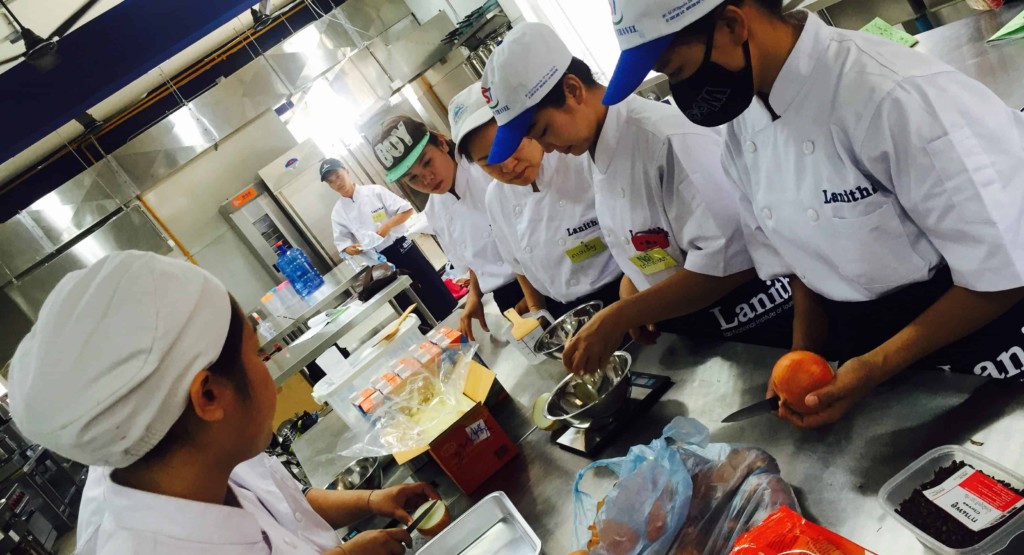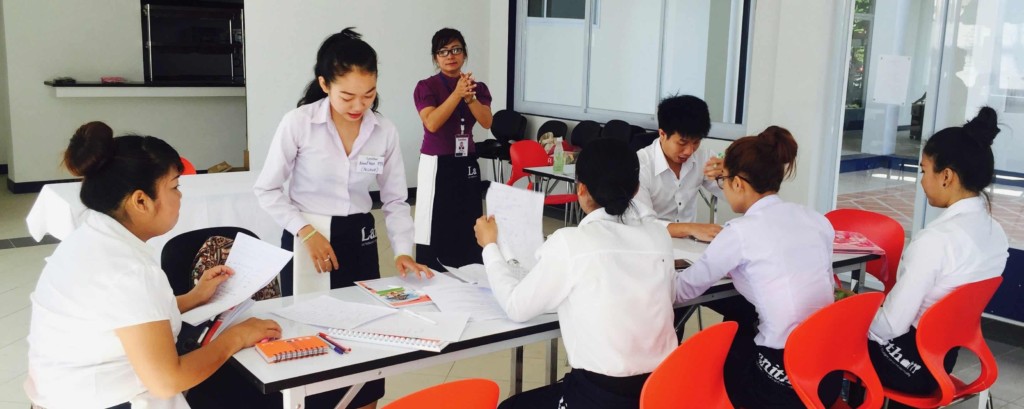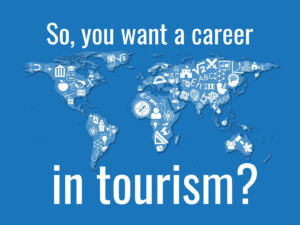What is destination human capital? It’s the people!

Peter Semone would advise any incoming tourism minister to focus on their destination’s people as a priority.
In this “GT” Insight, Mr Semone summarises the challenges and opportunities for destination human capital development and its potential contribution to the sustainable development goals (SDGs) and to tourism industry performance more generally.
In 2016, I concluded my eight-year relationship with Lao tourism and proudly left behind the school that I helped to develop, the Lao National Institute of Tourism and Hospitality (LANITH), knowing that my team was ready to manage it on their own.
It is during those eight years in ASEAN’s only landlocked country that I realised the most important element of a destination’s supply side: its people. People are the ambassadors that interact daily with international visitors. People define a country’s tourism character and soul. In fact I am so convinced that a renewed focus on “Destination Human Capital” is the next big thing for tourism that I started a company that goes by the acronym DHC.
Human capital development (HCD) is macro-economic and can be defined as improving the whole system of human interaction in the tourism experience with the objective of elevating the quality of tourism-related services resulting in enhanced benefits and profits for all tourism economy stakeholders. A destination’s HCD should not be confused with enterprise-level (micro-economic) human resource management (HRM) or human resource development (HRD), which is primarily concerned with recruitment, remuneration, assessment, and the ongoing in-service training of company employees.
To most people engaged in the tourism sector, “capital” means corporate cash reserves or physical assets such as a vehicle, restaurant, aeroplane or hotel. These are all forms of capital in the sense that they are assets that yield income and other useful outputs over varying periods of time. But these tangible forms of capital are not the only ones. Labour and land make up the other two factors of production in classical economics. Just as land has become recognised as ‘natural capital’ and an asset in itself, human factors of production have become known as ‘human capital’, which has become a critical index of competition in the world of business and a top priority in designing the strategic plans of business organisations and visitor industries.
In tourism, the economics of human capital are associated with the value that people bring to a destination’s quality of service. Arguably, competent, friendly and helpful people have a far greater impact on guest satisfaction at a destination than does extravagant infrastructure. Therefore, both tourism companies and destinations need to approach the development of their people with the same fervour they do the construction of hotels and attractions.

While major investment continues to flow into tourism infrastructure development in the form of hotels, airports and attractions, there is little attention being paid to producing the people that will define the personality of destinations and hospitality and tourism services in the future. Tackling human capital issues is widely recognised as critical to the success of international tourism but this, in practice, is frequently served more by rhetoric than action.
To remedy this dire situation people will need to be at the core of ensuring that the tourism industry of a destination remains competitive and sustainable. Indeed the best advice I could offer an incoming tourism minister is to focus on people and work toward inspiring an esprit de corps among public, private and civil society actors in support of inclusive and sustainable tourism.
Human capital development & the sustainable development goals
The issue of human capital in tourism is also critical to the achievement of the newly adopted Sustainable Development Goals (SDGs). During the 70th Session of the United Nations (UN) General Assembly 154 heads of state or government adopted the bold and ambitious 2030 Agenda for Sustainable Development, along with the 17 Sustainable Development Goals that aim to, inter alia, end poverty, protect the planet, and ensure prosperity for all.
Based on this universal, integrated and transformative vision, the UN World Tourism Organization (UNWTO) is placing its efforts and tireless work on contributing its technical assistance and capacity-building to the achievement of these global goals. UNWTO is working with governments, public and private partners, development banks, international and regional finance institutions, the UN agencies and international organisations to help achieve the SDGs, placing an emphasis on Goals 8,12 and 14 in which tourism is featured.
Notably, the UN General Assembly has approved the adoption of 2017 as the International Year of Sustainable Tourism for Development. The resolution, adopted on December 4, 2015, recognises “the importance of international tourism in fostering better understanding among peoples everywhere, in leading to a greater awareness of the rich heritage of various civilizations and in bringing about a better appreciation of the inherent values of different cultures, thereby contributing to the strengthening of peace in the world”.
Challenges & opportunities for human capital development
The founder of Four Seasons Hotels & Resorts, Isadore Sharp, is oft-quoted: “The reason for our success is no secret. It comes down to one single principle that transcends time and geography, religion and culture. It’s the Golden Rule — the simple idea that if you treat people well, the way you would like to be treated, they will do the same.”
Mr Sharp is correct. People are critical to the success of all tourism companies, particularly considering the increasing challenges of higher expectations and service standards, advancements in technology, regionalisation, deregulation, and globalisation. The relative importance of personal services in the tourism sector makes people the number one factor of production for most travel and tourism enterprises. Due to the fact that the travelling customer is directly in contact with line staff, and the quality of a product is largely reflected in employees’ ability to meet customer expectations, there is little margin for error when it comes to developing human capital.
Unfortunately, macro-level human capital development is frequently neglected or relegated to a footnote within tourism development strategies. This compromises the ability of people working within tourism’s private and public sectors to be able to support the delivery of quality experiences for all visitors to a destination. This, in turn, potentially leads to low levels of customer satisfaction.

There are several key challenges and opportunities for human capital development in tourism. These three, in particular, are significant in light of the SDGs:
- There is a challenge and opportunity to invest in women, especially in developing destinations where tourism can be a leading promulgator of gender equality.
- There is a challenge and opportunity to provide opportunities for young people who can contribute significantly to an industry facing severe talent deficits in most destinations.
- More generally there is a challenge and opportunity to better match supply and demand in the tourism labour market by bridging the gap between government, industry, and education providers.
Human capital development in education & training
In many countries, the education provided in public and private schools is perceived to be inadequate for the needs of tourism businesses, and the number of external tourism training institutions is insufficient to meet the needs of an expanding industry. Moreover, the number of in-house training programs is insufficient and their quality is often mediocre.
Formalised tourism education and training dates back some 120 years to Switzerland and specifically École Hôtelière de Lausanne. Subsequently it has developed in a wide variety of formats, institutional contexts and levels so that tourism education in some form is now offered in virtually every country. There is recognition that tourism education, both within the formative school, college, or university context and within the workplace through industry-based development programs, forms an essential building block in the search for a highly skilled workforce. This, in turn, can contribute directly to increased business success and improved destination performance.
Given this diverse landscape in tourism education and training, it is hardly surprising that the status and recognition accorded to programs varies greatly from country to country. While there are clear exceptions in the form of internationally-recognised colleges and universities offering tourism education and training — such as Cornell and the Culinary Institute of America in the USA; Hong Kong Polytechnic University in Hong Kong SAR, China; University of Queensland in Australia; University of Strathclyde in the UK; a number of specialist hotel schools in Switzerland — it is fair to say that much that is going on in the area of tourism education and training worldwide is relatively unrecognised, especially at lower academic levels.
There are other problems inherent in weak approaches to HCD in tourism. The lack of local education and training results in lost opportunities to generate quality, authentic local products and services that can be consumed in the visitor economy. Where the homogenisation of tourism products continues to increase, local education and training can help enhance the vitality of the industry, provide unique tourist experiences, generate opportunity for locals to enrich their lives on a global level, and minimise economic leakages.
Most experts agree that the government and other public institutions, such as national tourism organisations (NTOs), have a key role to play in the provision of training and in the improvement of human capital in the visitor economy. This is especially important for countries where a developed and education-conscious private sector is absent. The same energy and diligence with which NTOs have addressed the marketing and promotion of their countries must now also be focused on policies and strategies that will improve the quality of their destinations’ human capital.
Human capital development is a team effort
As I noted earlier, the best advice I could offer an incoming tourism minister is to focus on people. And, as noted by Esichaikul and Baum (1998), strong government support and guidance in human capital development is essential, especially in developing countries whose tourism sector is predominated by small- and medium-sized enterprises that lack the necessary resources and motivation to be involved in national-level HCD issues and whose education providers are often woefully deficient in quality instructors, pedagogical training facilities, and materials.
However, a country’s public sector cannot implement HCD on its own and must work with relevant stakeholders to:
- Engage in dialogue and partnership with the private sector;
- Better understand the tourism labour market through research;
- Identify tourism career paths and employment conditions;
- Provide quality education and training curricula and programmes;
- Develop core competency accreditation and certification schema;
- Develop service quality standards; and
- Roll out public awareness campaigns about the benefits of a career in tourism.
In my opinion even incremental improvements in the human resource landscape through a renewed focus on a destination’s human capital — its people — can improve the economic and social benefits derived from tourism.
Featured image: Capital. By Nick Youngson (CC BY-SA 3.0) via The Blue Diamond Gallery.
Reference
Esichaikul, R. and Baum, T. (1998), “The case for government involvement in human resource development: A study of the Thai hotel industry”, Tourism Management, 19/4. 359 – 370.
About the author

Peter Semone is managing partner of the strategic advisory organisation Destination Human Capital and founder of the internationally acclaimed Lanith – Lao National Institute of Tourism and Hospitality vocational school in Laos. He has acted as Chief Technical Adviser and Team Leader for European donor and Asian Development Bank projects. He also consults for United Nations agencies including the World Tourism Organisation and International Labour Organisation.
Currently serving as Chair of the Pacific Asia Travel Association (PATA) Foundation, Chair of the PATA Industry Council, and a member of PATA’s Executive Board, Peter has been an Association stalwart for more than 20 years. From 2002 – 2006, he worked for PATA as its Vice President.
Peter is widely published in peer-reviewed journals on topics related to tourism development and destination human capital. He enjoys lecturing and is in continual pursuit of a PhD in international tourism development studies. Peter spends his free time with his family in Bali.





